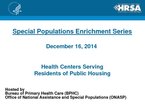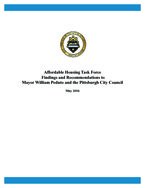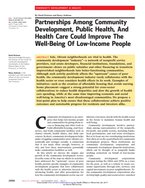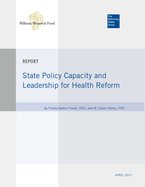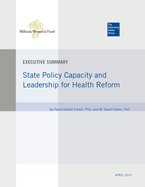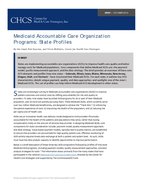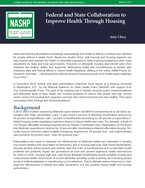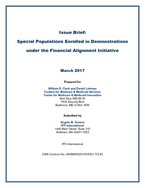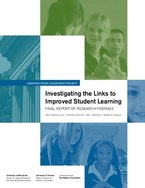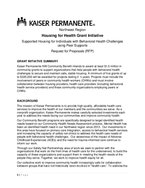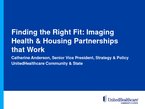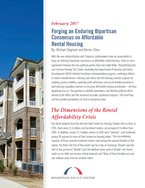Found 240 resources.
0
0
0
Topics: Asthma, East Coast, Health, Healthy homes, Housing, Low-income, Partnerships, Supportive housing
 Shared by Housing Is
on Jul 27, 2018
Shared by Housing Is
on Jul 27, 2018 0
0
0
On January 1, 2014, in states that have chosen to expand Medicaid eligibility under the Affordable Care Act, nearly all chronically homeless people who lacked health insurance became eligible for Medicaid. This Primer offers state Medicaid officials and other interested parties strategies for using Medicaid to meet the needs of this very vulnerable population--some strategies that have succeeded in the past and some that are emerging under provisions of the Affordable Care Act.
Topics: Affordable Care Act, Criminal justice, Disabilities, Dual-eligibles, Funding, Health, Homelessness, Housing, Low-income, Medicaid / Medicare, Mental health, Partnerships, Stability, Substance abuse, Supportive housing
 Shared by Housing Is
on Jul 27, 2018
Shared by Housing Is
on Jul 27, 2018 0
0
0
The Affordable Housing Task Force began with an assumption that there was a compelling need to address the changing landscape of housing affordability in Pittsburgh. Through research, discussion, and community and stakeholder engagement, the Task Force has arrived at recommendations that respond to both the assumption and the realities of affordable housing in the city.
Topics: Community development, Funding, Housing, Low-income, Partnerships, Seniors
 Shared by Housing Is
on Jul 24, 2018
Shared by Housing Is
on Jul 24, 2018 0
0
0
The community development “industry”—a network of nonprofit service providers, real estate developers, financial institutions, foundations, and government—draws on public subsidies and other financing to transform impoverished neighborhoods into better-functioning communities. Although such activity positively affects the “upstream” causes of poor health, the community development industry rarely collaborates with the health sector or even considers health effects in its work. We propose a four-point plan to help ensure that existing and future collaborations achieve positive outcomes and...
Topics: Community development, Food insecurity, Funding, Health, Low-income, Partnerships, Supportive housing, Transportation
 Shared by Housing Is
on Jul 24, 2018
Shared by Housing Is
on Jul 24, 2018 0
0
0
Both the Centers for Medicare & Medicaid Services (CMS) and New York State (NYS) have embarked on an ambitious journey to improve outcomes for patients and populations, reward the delivery of high value care by providers, and increase long-term financial sustainability. In this document, New York State presents an approach to maximally align CMS’ payment reform efforts for Medicare to the NYS’ Medicaid Payment Reform Roadmap which has recently been approved by CMS.
Topics: Funding, Low-income, Medicaid / Medicare, Partnerships
 Shared by Housing Is
on Jul 23, 2018
Shared by Housing Is
on Jul 23, 2018 0
0
0
The aim of the study was to understand how policy capacity was defined and managed by state health leaders in different political environments during the implementation of the ACA. We conducted a total of 24 interviews, 18 with state executive agency officials and six with legislators from 10 states. The the final sample includes two states from the Northeast, three from the South, three from the Midwest, and two from the West.
Topics: Affordable Care Act, Funding, Health, Legislation & Policy, Low-income, Medicaid / Medicare, Partnerships
 Shared by Housing Is
on Jul 23, 2018
Shared by Housing Is
on Jul 23, 2018 0
0
0
The aim of the study was to understand how policy capacity was defined and managed by state health leaders in different political environments during the implementation of the ACA. Working with a sample of states—large and small, red and blue, actively reformist or more circumspect, etc.—the research team interviewed 18 state executive agency officials and six legislators from 10 states about their experiences developing and sustaining the capacity needed for major transformations in health care
Topics: Affordable Care Act, Funding, Health, Legislation & Policy, Low-income, Medicaid / Medicare, Partnerships, Research
 Shared by Housing Is
on Jul 23, 2018
Shared by Housing Is
on Jul 23, 2018 0
0
0
States are implementing accountable care organizations (ACOs) to
improve health care quality and better manage costs for Medicaid populations. Core components that define Medicaid ACOs are: the payment model; quality measurement approach; and the data
strategy. This brief provides an overview of these core ACO elements and profiles how nine states -Colorado, Illinois, Iowa, Maine, Minnesota, New Jersey, Oregon, Utah, and Vermont -have structured their Medicaid ACOs. For each state, it outlines key ACO characteristics; details unique payment, quality, and data approaches; and spotlights ...
Topics: Cost effectiveness, Data sharing, Health, Low-income, Medicaid / Medicare, Metrics
 Shared by Housing Is
on Jul 23, 2018
Shared by Housing Is
on Jul 23, 2018 0
0
0
This issue brief outlines ways in which Medicaid can support integrated strategies and, based on telephone interviews with key informants, profiles three current initiatives that illustrate distinctly different approaches to linking Medicaid and supportive housing. The three initiatives include one launched by a city (Philadelphia), one by a state (Louisiana), and one by a Medicaid MCO (Mercy Maricopa Integrated Care in Phoenix, Arizona). They target special populations including homeless individuals, people with a wide range of disabilities, and adults with mental health and/or substance use...
Topics: Cost effectiveness, Health, Homelessness, Housing, Low-income, Medicaid / Medicare, Supportive housing
 Shared by Housing Is
on Jul 20, 2018
Shared by Housing Is
on Jul 20, 2018 0
0
0
Assisting public housing residents on the path towards self-sufficiency requires going beyond providing decent, safe, and affordable housing. Public housing residents may face barriers to employment, such as limited education, job skills and/or proficiency in the English language. This toolkit is a resource for both frontline staff and management. It offers examples of how partnerships between DOL and HUD can increase public housing resident employment and create mutual benefit for both agencies.
Topics: Criminal justice, Disabilities, Funding, Housing, Legislation & Policy, Low-income, MTW, Partnerships, Workforce development
 Shared by Housing Is
on Jul 19, 2018
Shared by Housing Is
on Jul 19, 2018 0
0
0
In December 2016, federal and state policymakers examined health and housing issues at a meeting convened in Washington, D.C., by the National Academy for State Health Policy (NASHP) with support from The Commonwealth Fund. The goal of the meeting was to identify concrete policy recommendations and actionable steps to align health and housing programs to ensure that people with high service needs receive the housing and supportive services they need to become and stay healthy. This report summarizes their findings and recommendations
Topics: Data sharing, Disabilities, Health, Homelessness, Legislation & Policy, Low-income, Medicaid / Medicare, Partnerships, Supportive housing
 Shared by Housing Is
on Jul 19, 2018
Shared by Housing Is
on Jul 19, 2018 0
0
0
Issue Brief: Special Populations Enrolled in Demonstrations under the Financial Alignment Initiative
This Issue Brief provides an update on the beneficiary experience in the first two demonstrations that were implemented as part of the Centers for Medicare & Medicaid Services (CMS) Financial Alignment Initiative to test integrated care and financing models for Medicare-Medicaid enrollees. The Washington Health Homes MFFS demonstration, a managed fee-forservice model demonstration, and the Massachusetts One Care demonstration, a capitated model demonstration, began operations on July 1st and October 1st of 2013, respectively.
For the purposes of this report, special populations...
Topics: East Coast, Health, Healthy homes, Immigrants, Low-income, Medicaid / Medicare, Pacific Northwest, Partnerships, Racial inequalities, Research
 Shared by Housing Is
on Jul 18, 2018
Shared by Housing Is
on Jul 18, 2018 0
0
0
This Issue Brief describes the results of focus groups conducted in six States as part of the Centers for Medicare & Medicaid Services Financial Alignment Initiative to test integrated care and financing models for Medicare-Medicaid enrollees. Five of these States—California, Illinois, Massachusetts, Ohio, and Virginia—are implementing a capitated model demonstration in which Medicare-Medicaid Plans (MMPs) provide coordinated benefits and access to new and flexible services through a person-centered care model. One, Washington, is implementing a managed fee-for-service model demonstration...
Topics: Cost effectiveness, Health, Healthy homes, Low-income, Medicaid / Medicare, Partnerships, Racial inequalities, Research
 Shared by Housing Is
on Jul 18, 2018
Shared by Housing Is
on Jul 18, 2018 0
0
0
The Mariposa Healthy Living Initiative began in 2009, when the Denver Housing Authority and its master planning team established physical, mental, and community health as a proxy to understand how redevelopment actions would change the quality of life for residents. The Initiative recognizes that the built environment is a determinant of health outcomes, which ultimately influence the quality and length of life for residents. The Initiative uses a responsive and rigorous approach to address environmental and social determinants of health, which include Healthy Housing, Environmental...
Topics: Housing, Low-income, Partnerships, Place-based, Preventative care, Research, Safety, Transportation, West Coast
 Shared by Housing Is
on Jul 17, 2018
Shared by Housing Is
on Jul 17, 2018 0
0
0
The South Lincoln Health Impact Assessment (HIA) focuses on the redevelopment master plan for the Denver Housing Authority’s South Lincoln Homes community in downtown Denver. The rapid HIA and masterplan was a four-month process that began in April 2009. The HIA identifies potential health impacts and recommends changes to optimize positive and minimize negative health consequences for the South Lincoln neighborhood. This assessment includes community demographic and socioeconomic information, identified potential health issues, interviews available surveys, and limited body measurement data...
Topics: Child welfare, Community development, Disabilities, Dual-generation, Health, Housing, Low-income, Mental health, Metrics, Nutrition, Preventative care, Research, Safety
 Shared by Housing Is
on Jul 17, 2018
Shared by Housing Is
on Jul 17, 2018 0
0
0
The Conway Center is a project of a nonprofit housing and services organization, So Others Might Eat, and a federally qualified health center, Unity Health Care, in Washington, DC. This $90 million community development initiative will colocate employment training, health care services, and affordable housing under one roof in Ward 7, an area of DC experiencing high poverty and unemployment, and poor health outcomes. The partnership aims to improve access to affordable rental housing, increase livable-wage job attainment, and connect residents to high-quality health care services. Although...
Topics: Community development, Cost effectiveness, Food insecurity, Health, Housing, Low-income, Medicaid / Medicare, Partnerships, Place-based, Stability
 Shared by Housing Is
on Jul 13, 2018
Shared by Housing Is
on Jul 13, 2018 0
0
0
This paper offers strategic guidance in building, assessing and/or strengthening various types of partnerships between Health Center Program Grantees, behavioral health providers and supportive housing providers. Whether you represent one of these types of organizations or you are merely curious about health and housing partnerships, you can use this guide as your roadmap.
Topics: Data sharing, Dual-eligibles, Health, Low-income, Medicaid / Medicare, Partnerships, Supportive housing
 Shared by Housing Is
on Jul 13, 2018
Shared by Housing Is
on Jul 13, 2018 0
0
0
Recognizing the layers to developing a health and housing partnership, this Literature Review and Resource Bank is intended to provide background and data resources that can be used in grant applications or in conversations with potential funders in the effort to foster new health and supportive housing partnerships.
Topics: Cost effectiveness, Criminal justice, Data sharing, Dual-eligibles, Funding, Health, Homelessness, Housing, Low-income, Medicaid / Medicare, Mental health, Partnerships, Post-secondary, Preventative care, Research, Seniors, Substance abuse, Supportive housing, Youth
 Shared by Housing Is
on Jul 13, 2018
Shared by Housing Is
on Jul 13, 2018 0
0
0
This document highlights actions states and other entities have taken to improve service delivery and financing of the services delivered by supportive housing providers.
Topics: Health, Housing, Low-income, Medicaid / Medicare, Partnerships
 Shared by Housing Is
on Jul 13, 2018
Shared by Housing Is
on Jul 13, 2018 0
0
0
Topics: CLPHA, Data sharing, Health, Housing, Legislation & Policy, Low-income, Medicaid / Medicare, Partnerships, Preventative care, Research
 Shared by Housing Is
on Jul 13, 2018
Shared by Housing Is
on Jul 13, 2018 0
0
0
This fact sheet describes how a landlord may legally prohibit smoking in common spaces and individual units, and explains how to implement a smokefree policy in compliance with the rent control law, where applicable. It also includes options for addressing possible enforcement and compliance issues that may arise once a policy is in place.
Topics: Family engagement, Health, Housing, Low-income, Smoke-free, West Coast
 Shared by Housing Is
on Jul 13, 2018
Shared by Housing Is
on Jul 13, 2018 0
0
0
The structure of the evaluation is designed around several research domains that, together, provide a comprehensive assessment of the Community-based Care Transitions Program. The research concentrates on the following areas:
• Program Implementation/Operational Issues.
• Beneficiary Participation.
• Provider Participation.
• Utilization and Readmissions.
• Costs/Savings.
• Quality Monitoring and Quality Improvement.
• Unintended Consequences.
Topics: Cost effectiveness, Data sharing, Health, Low-income, Medicaid / Medicare, Partnerships, Seniors
 Shared by Housing Is
on Jul 12, 2018
Shared by Housing Is
on Jul 12, 2018 0
0
0
This brief aims to bring attention to non-Medicaid funding sources that states could potentially blend or braid to address social determinants of health and other needs that are not typically covered by Medicaid. It is intended to familiarize state Medicaid, public health, and other state policymakers with the funding streams of other agencies, and sketch out a continuum of options to help states coordinate funding to better serve the needs of low-income populations. Because this brief focuses on services for adult Medicaid beneficiaries, it does not address many of the funding sources...
Topics: Cost effectiveness, Data sharing, Dual-eligibles, Food insecurity, Funding, Health, Homelessness, Housing, Legislation & Policy, Low-income, Medicaid / Medicare, Mental health, Partnerships, Research, Substance abuse
 Shared by Housing Is
on Jul 12, 2018
Shared by Housing Is
on Jul 12, 2018 0
0
0
With the new administration and Congress, policymakers have an opportunity to forge an enduring bipartisan consensus on affordable rental housing. There is more agreement between the two political parties than one might think: Strengthening the Low-Income Housing Tax Credit, expanding the Department of Housing and Urban Development (HUD)’s Rental Assistance Demonstration program, continuing efforts to reduce homelessness, infusing real choice into the housing voucher program by enabling greater mobility, expanding self-sufficiency and asset-building incentives, and reducing regulatory...
Topics: Dual-generation, Funding, Homelessness, Housing, Legislation & Policy, Low-income, Mobility, RAD, Research
 Shared by Housing Is
on Jul 12, 2018
Shared by Housing Is
on Jul 12, 2018 0
0
0
This report examines four specific aspects of the challenge before us:
• The need for a much greater supply of homes affordable to our nation’s lowest-income seniors.
• The importance of transforming homes and communities so that seniors can age with options, a desire shared by the overwhelming majority of older adults.
• The imperative to better integrate health care and supportive services with housing, recognizing that this integration has the potential to improve health outcomes for seniors and reduce the costs borne by the health care system.
• The need to deploy technologies on a far...
Topics: Cost effectiveness, Funding, Health, Home visiting, Homelessness, Housing, Legislation & Policy, Low-income, Medicaid / Medicare, Partnerships, Place-based, Preventative care, Seniors, Supportive housing
 Shared by Housing Is
on Jul 12, 2018
Shared by Housing Is
on Jul 12, 2018 
